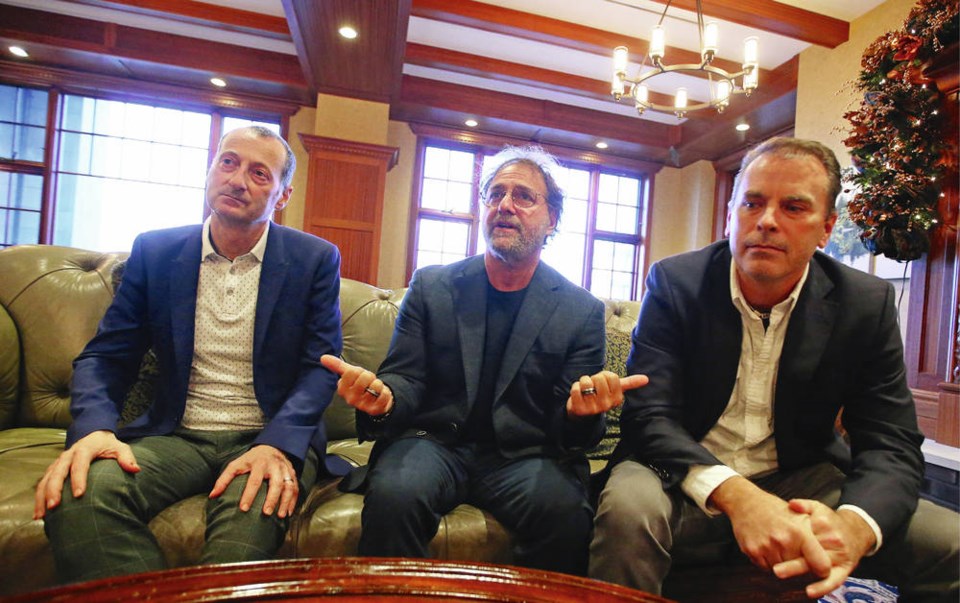Shares in Victoria-based Aurinia Pharmaceuticals Inc. jumped 26.7 per cent Monday, the first day of trading since the Food and Drug Administration in the U.S. approved the company’s drug treatment for lupus nephritis last week.
Aurinia’s stock price (TSX:AUP) closed at $23.91 Monday, up from Friday’s close of $18.87 giving the company a market capitalization — the total value of a company’s shares — of more than $3 billion.
Apart from the financial implications, the approval of Lupkynis (previously voclosporin) meant patients in the U.S. were able to start getting the treatment Monday.
“The sole aim is to help patients where there really are so few treatment options,” said Neil Solomons, Aurinia co-founder and chief medical officer.
Tests of Lupkynis, a capsule taken orally, found it was effective in the treatment of kidney inflammation caused by the autoimmune disease lupus. Lupus nephritis, which affects about three million people worldwide, can lead to kidney damage, kidney failure and death.
“We are all a little masochistic,” said Solomons during an online interview with fellow co‑founders Michael Martin and Robert Huizinga, noting the tendency in the pharmaceutical business is to go through a kind of hell to get a drug to market, breathe and then do it all over again.
“It’s genuinely not fun to do,” he said. “All it takes is one thank-you from a patient in the U.S., one thank-you for the work you’ve done and then every single minute will be worthwhile.”
“It’s been an 18-year overnight success,” said Huizinga, the executive vice president of research. “It’s taken a long time and a lot of persistence and effort to get over the finish line.”
Huizinga said the process has been filled with some highs and some incredible lows that at times had the team wondering if they’d ever see a positive outcome.
That was all wiped out with news from the FDA that the drug was approved. So far, the drug is only approved for use in the U.S.
“It is absolutely the biggest day in the history of the company,” said Martin, Aurinia’s chief business officer. “Thousands of companies try and develop drugs and very few get one across the line, and for us to do that ourselves from little, old Victoria is a real statement to the team.”
The company is poised to increase its investment in Victoria. Aurinia, which is housed at Vancouver Island Technology Park, has signed a lease for 20,000 square feet of space at what was the Times Colonist building, at 2621 Douglas St. That space is being renovated, and Aurinia expects to take up residence next year.
Martin said there will be new hires over the next three years adding as many as 40 new positions in Victoria. Aurinia currently has 55 staff in Canada and about 200 U.S. staff, most at its Rockville, Maryland, office. There are another 10 working around the world.
Martin said the long-term plan might include acquiring other drugs and companies.
“We’re here to build and we’re excited about that,” he said. “We’re not necessarily interested in selling the company — good companies are bought, they are not sold.”
Martin said Aurinia would, however, do what is best for the shareholders if someone offers to buy the firm.
Last year, ahead of FDA approval, Aurinia launched an education program — Time is Nephrons — for physicians to familiarize them with the treatment and drive home the importance of active screening and early detection of the disease to minimize the impact on kidney function and improve long-term outcomes for patients.
Solomons said the program was well received and got good feedback from doctors and patient groups.
Martin said the company is confident it can meet annual sales targets that analysts have forecast — between $60 million and $80 million US.
In December, Aurinia signed a $50-million deal with Japanese pharmaceutical firm Otsuka Pharmaceutical, giving the Asian firm the right to develop and market Lupkynis in Europe and Asia.
Solomons said getting FDA approval means solidifying the future of the company.
He noted until that approval was granted there were employees wondering if they might have a job. “Now we can say not only do you have your job but you have meaningful employment in a highly interesting and innovative company, and that’s a big deal.”



